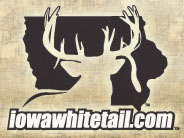G
Guest
Guest
Good article by Charles J. Alsheimer in OutdoorLife
A quote from the article...
Managing for Genetic Success
Although a doe’s genes may not be visually apparent, they are just as important to antler growth as the buck’s. Here are some things you can do to improve the genetics of your does.
What do you think?
A quote from the article...
Managing for Genetic Success
Although a doe’s genes may not be visually apparent, they are just as important to antler growth as the buck’s. Here are some things you can do to improve the genetics of your does.
What do you think?


